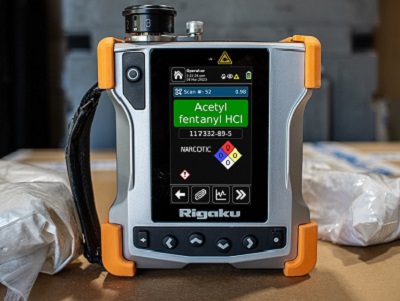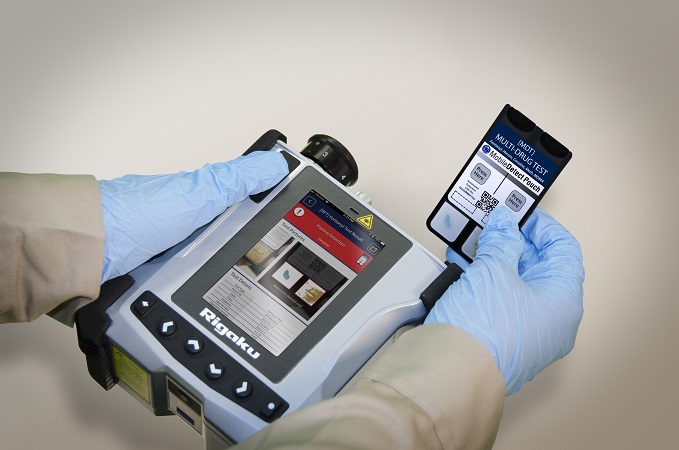Operation HOPLON Training Partnership
The illicit narcotics threat has evolved beyond the traditional production of drugs such as methamphetamine, cocaine and heroin. The evolution of synthetic opioids produced by global Transnational Organizations (TOC) actors in Latin America, the Middle East, and Asia are wholly reliant on the transshipment of essential precursor chemicals and drug distribution networks.
Rigaku has initiated a new law enforcement technical counterdrug interdiction assistance program - Operation HOPLON - in line with the U.S. government strategy to combat significant TOC actors operating in countries that have been identified as being the epicenters of transnational organized crime, terrorism, and drug production. A critical element in Rigaku’s law enforcement assistance strategy will be to support organizations like the U.S. Drug Enforcement Administration (DEA), the Department of Homeland Security (DHS), the Department of Homeland Security Investigations (HSI), U.S. Customs and Board Protection (CBP), as well as state/local and foreign law enforcement agencies with the implementation of a technical enforcement interdiction program aimed at helping to degrade narcotic trafficking activity.
.jpg?width=450&height=451&name=Rigaku_Coin-1%20(original%20as%20jpg).jpg)
Operation HOPLON is an ongoing, long-term, counter-narcotics technology-based partnership with law enforcement agencies to help degrade the ability of TOC actors to smuggle precursor chemicals across international borders. Rigaku’s focus is to enhance the ability of law enforcement organizations through the use of interdiction technology, used to detect, identify and degrade the illicit Precursor Chemical Supply Chain (PCSC) networks used by TOC actors and their proxies operating in drug production countries.
Integration Strategy
Rigaku’s Counter-Narcotics Interdiction Technology Division has partnered with Florida International University (FIU) National Forensic Science Technology Center (NSFTC) and foreign law enforcement agencies to enhance the chemical security posture of state actors, help degrade the global distribution of narcotics and to disrupt the flow and movement of illicit narcotics PCSC used by TOC actors to manufacture narcotics. The strategy will also integrate the use of the Rigaku ResQ CQL handheld 1064 nm Raman spectrometer for the detection and identification of narcotics, cutting agents, and precursor chemicals in order to enhance current law enforcement pre/post investigative efforts.

Rigaku has initiated a new law enforcement technical counterdrug interdiction assistance program - Operation HOPLON - in line with the U.S. government strategy to combat significant TOC actors operating in countries that have been identified as being the epicenters of transnational organized crime, terrorism, and drug production. A critical element in Rigaku’s law enforcement assistance strategy will be to support organizations like the U.S. Drug Enforcement Administration (DEA), the Department of Homeland Security (DHS), the Department of Homeland Security Investigations (HSI), U.S. Customs and Board Protection (CBP), as well as state/local and foreign law enforcement agencies with the implementation of a technical enforcement interdiction program aimed at helping to degrade narcotic trafficking activity.
Operation HOPLON is an ongoing, long-term, counter-narcotics technology-based partnership with law enforcement agencies to help degrade the ability of TOC actors to smuggle precursor chemicals across international borders. Rigaku’s focus is to enhance the ability of law enforcement organizations through the use of interdiction technology, used to detect, identify and degrade the illicit Precursor Chemical Supply Chain (PCSC) networks used by TOC actors and their proxies operating in drug production countries.
Benefits-at-a-Glance
When combined with the ResQ CQL, QuickDetect automated colorimetric mode adds the capability to detect non-visible amounts of a substance. This combines two powerful complimentary analysis techniques together into one instrument. Some of the benefits of utilizing QuickDetect mode include:
✔️Automatic generation of reports
✔️Electronic storage of and ability to quickly share results
✔️Preservation of chain of evidence with the automatic picture and addition of any notes related to the scan
✔️Automatic time/date stamp of scan within report
✔️Automated colorimetric removes the guesswork and error of color matching with the human eye with the human eye

Implementation
Once the Rigaku equipment has been procured, the following training program* will be available to the agency either at the FIU facility or in the host country.
- Overview of Raman spectroscopy, including capabilities + limitations
- Operation of the Rigaku devices, including hands-on and sampling techniques
- Field practical exercises
*Topics can be adjusted depending on the needs and logistics of the specific location/class focus.
Florida International University Background
Florida International University (FIU) is ranked as the 4th largest public university in the U.S. and the 2nd largest in Florida. The Carnegie Foundation has named FIU in two of their top tier classifications, (1) High Research and a Community Engaged University and (2) R1: Doctoral University – Highest Research Activity. FIU also has an extensive and unprecedented skill set that goes well beyond research in order to assist with the National Center on Forensics.
FIU’s Global Forensic and Justice Center (GFJC) is a preeminent university-wide forensic science and justice initiative coordinating all of the ongoing forensic science efforts at FIU.
The International Forensic Research Institute (IFRI) serves local and national law enforcement efforts in the application of scientific principles to the administration of justice. The mission of this self-supporting institute is to conduct original research in forensic science, transfer technologies from other scientific disciplines for use in forensic applications, provide scientific expertise to the law enforcement and legal community and to provide needed continuing education and advanced training to practicing scientists.
Program Conclusion
Rigaku and FIU are committed to partnering with both domestic and international law enforcement organization to assist them in employing the latest counter-drug training, drug identification methods and implementing enforcement/intelligence strategies to identify and degrade the PCSC networks to mitigate the capabilities of TOC actors and their proxies.

Contact Us
Whether you're interested in getting a quote, want a demo, need technical support, or simply have a question, we're here to help.
